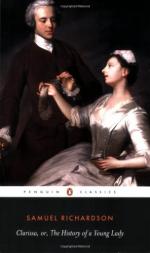that by reason of any pre-contract, [I verily think
that I have had three or four pre-contracts in my
time; but the good girls have not claimed upon them
of a long while,] consanguinity, affinity, or any
other lawful cause whatsoever, there be no lawful
impediment on this behalf; and that there be not at
this time any action, suit, plaint, quarrel, or demand,
moved or depending before any judge ecclesiastical
or temporal, for or concerning any marriage contracted
by or with either of you; and that the said marriage
be openly solemnized in the church above-mentioned,
between the hours of eight and twelve in the forenoon;
and without prejudice to the minister of the place
where the said woman is a parishioner: We do hereby,
for good causes, [it cost me—let me see,
Jack—what did it cost me?] give and grant
our License, as well to you as to the parties contracting,
as to the Rector, Vicar, or Curate of the said church,
where the said marriage is intended to be solemnized,
to solemnize the same, in manner and form above specified,
according to the rites and ceremonies prescribed in
the Book of Common Prayer in that behalf published
by authority of Parliament. Provided always,
that if hereafter any fraud shall appear to have been
committed, at the time of granting this License, either
by false suggestions, or concealment of the truth,
[now this, Belford, is a little hard upon us; for
I cannot say that every one of our suggestions is
literally true:—so, in good conscience,
I ought not to marry under this License;] the License
shall be void to all intents and purposes, as if the
same had not been granted. And in that case we
do inhibit all ministers whatsoever, if any thing
of the premises shall come to their knowledge, from
proceeding to the celebration of the said Marriage;
without first consulting Us, or our Vicar-general.
Given,’ &c.
Then follow the register’s name, and a large
pendent seal, with these words round it—seal
of the vicar-general and official
principal of the diocese of
London.
A good whimsical instrument, take it altogether!
But what, thinkest thou, are the arms to this matrimonial
harbinger?—Why, in the first place, two
crossed swords; to show that marriage is a state of
offence as well as defence; three lions; to denote
that those who enter into the state ought to have
a triple proportion of courage. And [couldst
thou have imagined that these priestly fellows, in
so solemn a case, would cut their jokes upon poor
souls who came to have their honest desires put in
a way to be gratified;] there are three crooked horns,
smartly top-knotted with ribands; which being the
ladies’ wear, seem to indicate that they may
very probably adorn, as well as bestow, the bull’s
feather.
To describe it according to heraldry art, if I am
not mistaken—gules, two swords, saltire-wise,
or; second coat, a chevron sable between three bugle-horns,
or [so it ought to be]: on a chief of the
second, three lions rampant of the first—but
the devil take them for their hieroglyphics, should
I say, if I were determined in good earnest to marry!




